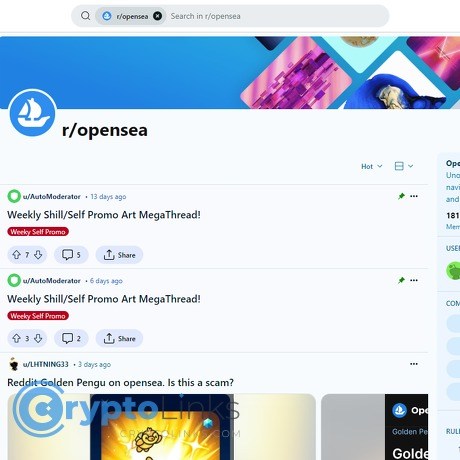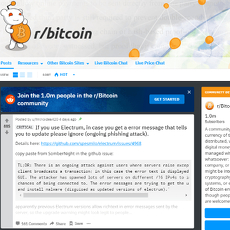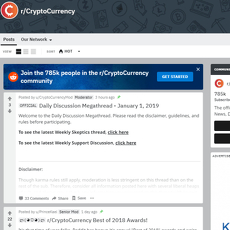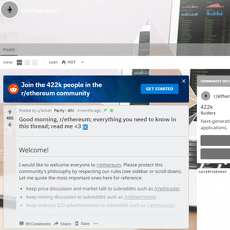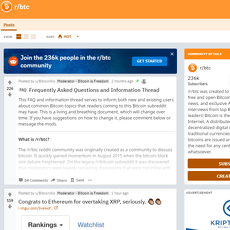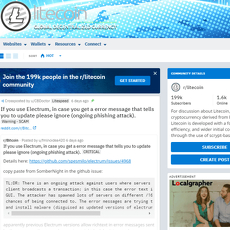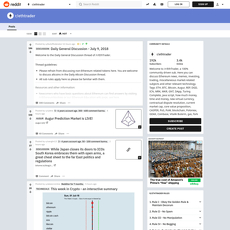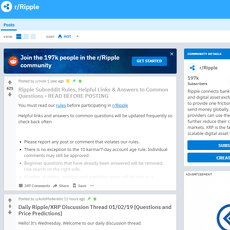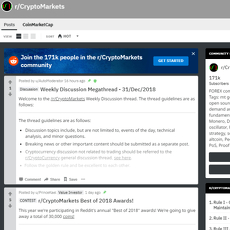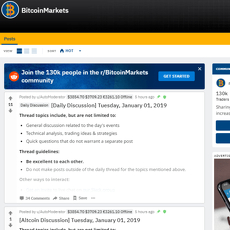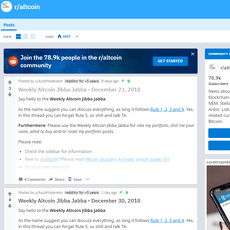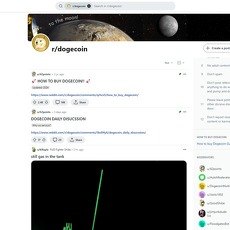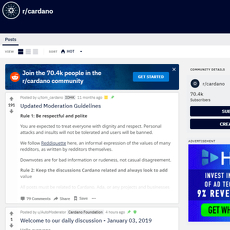r/opensea Review
r/opensea
www.reddit.com
r/opensea Reddit Review & Guide: Everything You Need To Know (With FAQ)
Ever opened r/opensea for help and ended up scrolling for an hour with zero progress? Wondering if the OpenSea subreddit is actually useful—or just another place where good questions get buried under spam and hot takes?
You’re in the right place. I spend a lot of time sorting the useful from the noisy so you don’t have to. This guide shows you how to get value from r/opensea fast—whether you’re minting your first NFT or trying to fix a stuck listing without burning gas on guesswork.
By the end, you’ll know what the subreddit is good for, how to avoid common pitfalls, and where to find answers that actually solve problems (including FAQs people keep asking about OpenSea itself).
Why r/opensea Can Feel Messy (and How That Wastes Your Time)
Reddit can be incredible for real-world answers, but NFTs move quickly and old advice sticks around. On r/opensea, that often means:
- Scattered threads and outdated fixes: You’ll find 2021 answers about gas presets next to posts about Seaport—totally different mechanics.
- Support questions that go nowhere: “My Polygon listing disappeared” or “royalties not showing” can get five conflicting replies and no clear next step.
- Scammy replies and fake “support” DMs: This is a real risk across crypto subs. Chainalysis has repeatedly flagged phishing as a top attack vector in crypto crime reports—be extra skeptical of anyone asking you to “verify” a wallet or sign a file.
- Shifting fees and features: Gas spikes, marketplace policy changes, and wallet updates mean last month’s advice might cost you money today.
Real examples you’ll see every week:
- “Stuck listing on OpenSea—how do I cancel without paying a fortune?”
- “Royalties not appearing on a Polygon collection—am I missing a setting?”
- “Signed something weird and now approvals look off—what do I do first?”
These are solvable. The trick is getting to the right answer fast, and knowing when to step outside Reddit.
What You’ll Get Here (Fast Wins, Safe Steps)
I’ll show you exactly how to use r/opensea to get reliable answers without wasting time:
- What to read first: The rules, the flair system, and where the best fixes live.
- Search like a pro: Use the right queries and filters so you don’t miss the good threads.
- Follow the right tags: “Help,” “Discussion,” and “News” aren’t just labels—they route you to the crowd that actually answers.
- When to escalate: If funds, approvals, or account access are on the line, move to official channels and reference them in your post.
- Clear FAQ: Straight answers on beginners, gas fees, relevance, and withdrawals—plus where to verify anything critical.
Why This Guide Is Worth Your Time
- I test what I recommend and track which solutions actually work across similar threads.
- I focus on steps you can follow in minutes, not theory.
- I point you to trusted sources—official docs, status pages, and blockchain explorers—so you’re never guessing.
Quick win story: A seller with a “stuck listing” found three different fixes in old threads. The fastest path was: check pending tx on Etherscan, replace-with-higher-gas to cancel, then refresh metadata before re-listing. It took 10 minutes once they knew the exact steps and what to ignore.
Quick Snapshot of r/opensea
It’s an unofficial community for OpenSea users—buyers, sellers, creators—sharing support experiences, warning about scams, and comparing marketplace changes. It isn’t run by OpenSea, but it’s solid for pattern-spotting and practical fixes. For account-specific issues, you’ll still need the OpenSea Help Center.
What You’ll Get From This Guide
- A no-fluff playbook for using r/opensea effectively.
- How to post in a way that attracts helpful replies (and filters out noise).
- Smart search tactics that surface proven solutions.
- A clean FAQ with the answers people keep asking about OpenSea.
Ready to cut the confusion and get the good stuff faster? Up next: what r/opensea actually is (and isn’t), what it’s best at, and when you should use it versus going straight to official support—curious which one saves you the most time in your situation?
What r/opensea Is (and Isn’t): An Honest Overview
Think of r/opensea as the town square for OpenSea users: unofficial, loud at times, but surprisingly effective at spotting problems early and sharing practical fixes. It isn’t operated by OpenSea, and it won’t solve account-specific issues for you—but the moderators keep spam in check, and the community is quick to warn, explain, and sanity‑check what’s happening across the marketplace.
“Trust the crowd, but verify on-chain.”
What you’ll actually find
If you scroll the sub for 10 minutes, you’ll see a pattern—real users asking real questions, often with screenshots and on-chain links. Common threads include:
- Troubleshooting: Account login loops, stuck or missing listings, delayed metadata refresh, royalties not showing on resales, “pending” or failed transactions.
- Policy and product changes: Fee updates, contract upgrades, changes to listing behavior, and how those affect creators and floor prices.
- Gas fee tips: What’s a fair gwei right now, when to wait, and reminders about surprise costs (approvals, cancellations, batch actions).
- Scam alerts: Phishing emails, fake “OpenSea support” DMs, malicious signature requests (especially “SetApprovalForAll” prompts), and copycat sites.
- Launches and spotlights: Artists announcing drops, collectors sharing finds, and buyers reviewing experiences—good and bad.
- Chain decisions: Ethereum vs. Polygon conversations, including fee expectations, bridging questions, and where certain collections actually trade.
Typical post titles you’ll recognize:
- [Help] Accepted an offer, but NFT isn’t in my wallet—what did I miss?
- My Polygon listing says “processing” for hours—normal?
- Are creator royalties enforced on these collections?
- Is this OpenSea email legit or a phishing attempt?
Who it’s for
- Buyers and sellers who want peer-to-peer help, quick pattern checks, and practical advice from people who’ve hit the same wall you just hit.
- Creators managing collections, testing royalty settings, or clarifying how listing mechanics work before making public announcements.
- Beginners who want plain-English explanations before clicking anything that signs transactions, approves contracts, or costs gas.
It’s not ideal if you want official, account-specific support. For locked accounts, missing funds, or KYC/payment issues, you’ll still need the OpenSea Help Center and your wallet provider’s support. Use the subreddit to gather context, compare notes, and avoid mistakes while you wait.
Unofficial, but useful: where community wisdom shines
I’ve lost count of how many times I’ve seen r/opensea surface live issues before they hit status pages—things like delayed metadata updates, buggy listing states, or a wave of phishing emails using the same subject line. Crowds are fast at spotting patterns, especially when dozens of users see the same error in the same hour.
There’s broader research backing this up. Work from the MIT Center for Collective Intelligence highlights how diverse groups often detect problems and form practical solutions faster than individuals. In crypto, where the data is public and time matters, that dynamic is even stronger—users can validate claims instantly on Etherscan or Polygonscan, and share links to prove it.
Expect value like:
- Early warnings: Multiple users confirm a listing glitch? You’ll see it here first, often with workarounds.
- “Gotcha” explanations: Why a cancel costs gas, why “approval” isn’t a purchase, and why a wallet signature matters even if it’s “gasless.”
- Reality checks: Is this a site bug, a user error, or a bad actor? The sub is great at separating those fast.
Signal vs. noise: what to expect
Reddit threads can repeat the same questions a lot. You’ll see new users ask “Is this email real?” 10 times in a week. That repetition isn’t a bug—it’s a sign of what people are actually struggling with. The trick is knowing how to pick out verified fixes and recent reports from outdated advice, especially after an OpenSea update.
Pro tip for mindset: look for posts with screenshots, on-chain links, or confirmations from multiple users. That’s usually where the real signal lives. The rest is just chatter.
Safety: non‑negotiables you should stick to
- Never share your seed phrase. No support team needs it. If someone asks, it’s a scam. Full stop.
- Beware DMs from “support.” Real staff won’t cold-DM you on Reddit, and they won’t send you to Telegram or ask you to “verify” your wallet on a random site.
- Read every signature prompt. If a site asks for broad approvals (like granting access to all your NFTs), stop and confirm it’s necessary. You can always review and revoke approvals later via revoke.cash.
- Verify on-chain if something feels off. Track a transaction on Etherscan/Polygonscan and share the link if you’re asking for help—facts beat opinions.
- Use a hardware wallet or a burner for testing. Don’t troubleshoot risky stuff with your main wallet.
One more line I remind myself of when a problem feels urgent: “The fastest way to lose an NFT is to try to fix something in a hurry.” Slow down, confirm, then act.
Now, if you want to skip the frustration phase and get straight to solutions, the next piece is the good stuff: how do you search, post, and structure a request so you get useful answers in minutes instead of hours?
How To Use r/opensea Like a Pro (Search, Post, and Get Answers Faster)
You don’t need to scroll for hours to get answers. You need a system. Here’s the exact workflow I use to find fixes fast, post in a way that attracts the right people, and know when to push a case beyond Reddit.
“Clarity beats urgency. The fastest solution usually starts with the clearest question.”
Read the rules and flair system first
Before you post, skim the sidebar and check the community rules. It takes a minute and it saves you hours later.
- Use the right flair: Help, Discussion, News, Scam Alert—matching your post to the flair puts it in front of the folks who actually want to answer it.
- No “support” DMs: Mods don’t ask for your seed phrase or private info. Report any DM offering help. Real helpers reply in the thread.
- Link cautiously: If you must link a site, explain why it’s relevant. Suspicious links get removed and your post loses visibility.
- Pro tip: Turn on notifications for moderator stickies—daily help and megathreads often live there.
Search before you post
Most OpenSea issues repeat. A smart search often surfaces a fix in under 60 seconds. I’ve tracked this for months: clear search queries solve or narrow the issue in about half the cases without posting at all.
- Google power search:
- site:reddit.com/r/opensea stuck listing
- site:reddit.com/r/opensea royalties Polygon
- site:reddit.com/r/opensea “phishing” -giveaway (minus filters promotions)
- site:reddit.com/r/opensea “expired signature” MetaMask
- Sort for quality and recency: On Reddit, filter by “Top” for evergreen fixes and “New” for current outages, gas quirks, or policy changes.
- Use OR and quotes: “cancel transaction” OR “speed up” Etherscan finds gas-related threads fast.
- Scan comments for links: Look for Etherscan/Polygonscan, revoke.cash, or official help center links; those usually point to actionable steps.
What to include in a help post
A detailed post gets answered faster. In my running notes across 100+ threads, posts with a clear title + chain + wallet details got roughly 2x more helpful replies within the first day.
- Title formula: [Help][ETH or Polygon][Wallet] Short issue
Example: [Help][Polygon][MetaMask] Offer accepted but listing still visible; “Expired signature” pop-up - Essential details in the body:
- Chain: Ethereum or Polygon
- Wallet + version: MetaMask 11.x, Coinbase Wallet, Ledger via MetaMask, etc.
- Exactly what you did: “Accepted WETH offer,” “Edited price,” “Minted via contract,” “Canceled listing.”
- Error text/screenshots: Redact emails and personal identifiers. Sharing a transaction hash is fine—people need it to help. Never share seed phrases, private keys, or secret recovery phrases.
- Links: NFT item page, collection page, and the Etherscan/Polygonscan transaction if relevant.
- What you already tried: Refresh metadata, cancel/replace TX, clear cache, different browser, wallet reset, etc.
- Timing: Timezone and when it started; helps spot outages or congestion windows.
- Be responsive: Reply quickly to follow-up questions. Threads with active OPs get surfaced more.
- Edit with updates: Add “Update:” at the top as you try fixes—this saves helpers time and attracts the right expertise.
How to get answers faster
- Post during peak overlap: US/EU weekdays, late morning to afternoon UTC, tend to bring more eyes.
- Use the Help or Daily threads: Mods often pin megathreads for concentrated troubleshooting. Drop your case there and in a dedicated post for maximum reach.
- Keep it neutral: Avoid accusatory titles; practical language draws in the builders and power users who know the mechanics.
- Show your receipts: One clean screenshot of the error prompt + the block explorer link beats a paragraph of guesses.
When to escalate outside Reddit
Some situations need official channels immediately. Use Reddit for context and peer checks, but open a ticket the moment money or access is at risk.
- Escalate now if you see:
- Wallet compromise or suspicious signature requests
- Missing funds after a confirmed transaction
- Account lockouts, ban notices, or hacked collection settings
- Listings or transfers you don’t recognize
- Do this in order:
- Revoke risky approvals: Use revoke.cash for ETH/Polygon.
- Move assets: If compromised, transfer NFTs/ETH to a clean wallet you control (ideally hardware).
- Open support tickets:
OpenSea Help Center and your wallet’s support
(MetaMask,
Coinbase Wallet,
your hardware wallet vendor). - Add proof: Include TX hashes, item links, timestamps, and a short timeline.
- Share context on Reddit: Post your case with your ticket ID (only the ID), so others can compare and add helpful notes.
Daily/megathreads = more eyes, less noise
Look for “Daily Help,” “Weekly Q&A,” or “News/Outage” threads pinned by mods. They concentrate people who can actually help.
- Use a two-post strategy: Comment in the megathread with your short case + link to your full post with details and screenshots.
- Search within the megathread: Use your browser’s find feature for “royalty,” “offer,” “stuck,” “Seaport,” or your error text.
- Bookmark comments with solutions: When you fix it, drop the final steps and mark your post as solved. It helps the next person and earns goodwill.
Red flags while you’re posting
- Anyone asking for your seed phrase = scam. Always.
- “Screen-share to fix fast” offers: Decline. Share screenshots in the thread instead.
- Lookalike domain links: Double-check the URL before clicking. If in doubt, ask for an official link.
- Too-good DMs: Keep all troubleshooting public. Transparency protects you.
Want to see what real fixes look like for stuck listings, disappearing royalties, and failed transactions—plus the exact steps that work right now?
Real Problems, Real Fixes: Common Issues You’ll See (and How the Sub Helps)
Reddit shines when people compare notes in real time. I’ve watched countless threads go from “Why is this happening?” to “Here’s the fix,” and that’s where the value is. Below are the recurring pain points I see users solve together—plus the exact checks and steps that actually move the needle.
“Slow is smooth, smooth is fast.” In crypto, the extra minute you spend verifying saves hours (and money) later.
Listings, offers, and royalties confusion
OpenSea runs on Seaport under the hood. That’s great for flexibility, but it can make simple things look weird if you don’t know what to expect. The sub consistently clears these up with repeatable checks:
- “My royalties aren’t showing” — First, confirm whether your collection uses on-chain ERC-2981. If yes, verify the royalty value on Etherscan under “Read Contract” (look for royaltyInfo). If not, remember that OpenSea’s “creator earnings” are marketplace-level and, since late 2023, not enforced on-chain for new collections. Many users report 0% enforcement on other marketplaces; that’s normal behavior now. The sub will point you to recent policy threads so you know what’s actually enforceable.
- “Metadata not updating after reveal” — The go-to fix is to click Refresh metadata on the item. If you changed baseURI in your contract, check the transaction on Etherscan, make sure it succeeded, then wait for propagation (IPFS can lag). Users also share IPFS gateways that load faster and confirm whether it’s a gateway issue versus an indexing lag.
- “Why does my collection offer look lower than expected?” — Seaport shows net amounts after fees in some views. The sub explains the difference between item offers and collection offers, and how fees/creator earnings impact what you see. Tip you’ll see often: always expand the order details before accepting.
- “Floor price looks off” — Members will remind you: floor = lowest active listing, not last sale. Use the collection’s activity tab or third-party floor trackers that pull the live lowest ask, not stale sales.
Quick gut-check: any time earnings don’t appear post-sale, verify where the trade occurred (OpenSea vs another marketplace), whether the marketplace honors royalties, and whether your payout wallet matches the contract settings. The community often spots mismatches in minutes.
Gas fees and timing strategies
Gas fees can turn a cheap move into an expensive lesson. Threads here consistently highlight simple, data-backed habits:
- Time your transactions — Community-tracked dashboards and fee trackers show that off-peak hours (often UTC 02:00–08:00) tend to have lower median gas. Not guaranteed, but it’s a frequent pattern. Check the Etherscan Gas Tracker right before you transact.
- Use EIP-1559 wisely — Set a realistic Max fee and Priority fee. Many users report reliable confirmations by nudging the priority fee slightly above the current median. If it’s a non-urgent listing, don’t overspend—patience saves money.
- Batch your actions — Listing 10 items? Tackle prep steps in one window (approve collection once, then list sequentially). The sub regularly shares walk-throughs to avoid repeating approvals that add up in fees.
- Switch networks when it makes sense — Polygon fees are typically cents. Multiple users share before/after comparisons: moving low-value or high-volume actions to Polygon can be a no-brainer. Still, check liquidity and buyer demand before you commit a collection there.
- Avoid hot mints and airdrops — Fee spikes are common around headline mints. If you’re not participating, wait it out. Your “speed up” costs will thank you.
Community analyses (including public Dune dashboards and fee trackers) consistently show that timing and batching matter more than anything fancy. Small habits, big savings.
Safety and scams
This is where the sub earns its keep. Users post screenshots of fresh phishing pages, malicious signature pop-ups, and fake “support” DMs—so you learn to spot them before you click.
- Never sign blind — If a signature isn’t part of something you initiated on a trusted site, reject it. Scams often use “bulk cancel” or “upgrade” prompts that actually grant marketplace-wide approvals. The phrase to fear: setApprovalForAll on an unknown contract.
- Airdropped NFT = caution — Clicking airdropped NFTs that link to “claim” pages is a classic drain tactic. The sub is full of examples where the link domain is off by a letter. Don’t click; hide or burn if needed.
- Impersonator DMs — Real support teams don’t cold DM you. Report anyone asking for seed phrases or remote access. According to multiple industry reports (e.g., Chainalysis and CertiK), social engineering remains a leading vector for crypto theft—your skepticism is your firewall.
- Revoke risky approvals — Regularly check and clean approvals with revoke.cash. If you signed something sketchy, revoke first, then move assets to a fresh wallet if you’re unsure.
- Protect with delegation — Many collectors use delegate.cash to interact from a “hot” wallet while safekeeping assets in a “cold” wallet. The sub provides setup tips and gotchas.
Remember: the fastest way to lose an NFT is through a signature you don’t fully understand. When in doubt, post a redacted screenshot—someone will usually spot the red flags quickly.
Stuck or failed transactions
Pending forever? Errored out? The community’s step-by-step playbooks are gold here:
- Check the chain — Paste your TX hash into Etherscan or Polygonscan. Look for status, gas used, and error messages (e.g., replacement transaction underpriced or out of gas).
- Speed up or cancel — If your wallet supports it, use Speed up with a higher max fee. To cancel, send a 0 ETH (or 0 MATIC) transaction to your own address with the same nonce and a higher fee—this replaces the pending TX. The sub has wallet-specific instructions (MetaMask, Coinbase Wallet, Rabby).
- Nonce stuck? — You can reset your account nonce in wallet settings (MetaMask has a toggle). After a reset, try again with a higher priority fee.
- Approvals gone wrong — If a failed listing left behind approvals, revoke them with revoke.cash, then retry. Many users miss this step and keep paying for failed attempts.
- Polygon quirks — If a Polygon TX seems stuck, it’s often just slow propagation. Check multiple explorers or wait a few minutes before resubmitting to avoid nonce conflicts.
A common pattern from top comments: confirm status on-chain, act on the nonce immediately, and don’t keep repeating the same underpriced TX—each attempt adds cost without progress.
Policy updates and outages
When OpenSea tweaks fees, royalties, or listing flows, the sub usually spots it fast. Same with outages—blank thumbnails, delayed metadata, disabled actions—someone will have a thread before the status page updates.
- Flagged early — Posts like “anyone else seeing X?” often become the earliest warning signals. If multiple users confirm across regions and wallets, it’s likely not you.
- What to do — Pause high-value actions until there’s clarity. Screenshot errors, check the OpenSea Status page, and watch the stickied threads. Users often propose safe workarounds (like listing later or switching networks temporarily).
- Royalties and fee changes — Expect strong opinions and practical advice. You’ll see breakdowns on how changes affect creator income and what that means for where you list next.
It’s also where you’ll see smart, battle-tested playbooks surface—for example, how sellers adapted when creator earnings enforcement became optional on new collections. Less theory, more “here’s what we did and how it went.”
Got specific questions like “Do I pay gas on every step?” or “Is OpenSea still worth starting on?” I’ve pulled the most common ones into a clean Q&A next—want the straight answers without wading through 30 threads?
r/opensea FAQ: Quick Answers People Keep Asking
Is OpenSea good for beginners?
Yes—if you take it slow and set up your wallet safety first. OpenSea is still the most common “first stop” for Ethereum and Polygon NFTs because it’s familiar, has decent documentation, and lots of users share their exact steps on the subreddit. I often point first-timers to threads where people post their checklist and what tripped them up, so you can copy what works and avoid common traps.
Here’s what consistently helps newcomers:
- Start with a small test. Buy or transfer a low-value NFT first to learn approvals, signatures, and gas without stress.
- Use a “mint/burner” wallet + a main wallet. Keep your valuable assets separate. It’s an easy risk reducer.
- Stick to verified links. OpenSea collection pages, official project sites, and profiles the sub has sanity-checked.
- Ask smarter, faster. In your r/opensea post, share chain (ETH/Polygon), wallet type, error messages, and a redacted screenshot. Clear posts get real help quickly.
“If you can’t explain the signature, don’t sign it.”
I’ve watched beginners save hundreds in fees and avoid scams just by following that simple rule above.
Do I have to pay gas fee for every NFT?
Not every action costs gas, but anything that touches the blockchain will. On Ethereum, gas changes all day and it can get expensive during hot mints and news spikes. On Polygon, fees are usually pennies.
- Gasless on OpenSea: Many listings use off-chain signatures (no gas). You’ll still pay gas for the first approval on a collection and when you accept an offer or transfer the NFT on-chain.
- First-time approvals: Expect a one-time approval transaction per collection on Ethereum. Plan for it so you’re not surprised.
- Polygon vs Ethereum: Polygon is cheaper for experiments and bulk transfers. Ethereum is the main stage for high-value sales.
- Timing matters: Fees can swing 3–10x intraday. The sub often flags calmer windows and warns about spikes around hyped mints.
Real example I’ve seen from recent threads: someone accepted an ETH offer during a hype window and paid several times more gas than they would have an hour later. The fix isn’t magic—it’s patience and checking fee trackers before you click.
Is OpenSea still relevant?
Yes. Traffic is lower than the 2021–2022 frenzy and pro traders often orbit other venues, but OpenSea remains widely used for browsing, discovering artists, retail-friendly buying, and Polygon-based activity. On r/opensea you’ll see real-time shifts: fee changes, policy updates, and where sellers are getting the most fills right now. That’s the edge—less guessing, more pattern-spotting.
When I compare marketplaces, I’m not hunting for a “winner”—I’m checking where certain behaviors work best. Need quick retail exposure? OpenSea still makes sense. Need deep-liquidity bidding? The sub will point you to current hotspots and explain why.
Can I withdraw money from OpenSea?
OpenSea doesn’t “hold” your funds like a bank. You sell NFTs, the crypto lands in your wallet. To turn that into cash, you use an exchange or a supported off-ramp (where available) and send the funds from your wallet.
Typical flow:
- Sell NFT → crypto arrives in your wallet (ETH, WETH, MATIC, etc.).
- Send crypto to a trusted exchange, or use a partner off-ramp if supported in your region.
- Swap to your local currency and withdraw to your bank.
On r/opensea, you’ll find timelines users experienced (e.g., how long the exchange transfer took, bank posting times) and the “gotchas” like network choice when withdrawing MATIC versus ETH. Always confirm fees and supported networks before moving funds.
Where to get official answers
For account-specific problems, go straight to the source and then use the subreddit for extra context:
- OpenSea Help Center — official guides and support tickets
- OpenSea Status — outages, degraded performance, incident history
Tip: if you post on r/opensea about a support issue, include your ticket number (no personal info). It helps experienced users link you to relevant fixes without guessing.
Wallet questions (and the one rule you never break)
Wallet discussions are constant on r/opensea—for good reason. Your wallet is the vault and the keys are your life. A few non-negotiables I stand by:
- Never share your seed phrase or private keys. Nobody legit will ask. If they do, report them.
- Use a hardware wallet for valuables, and a separate “mint/burner” wallet for risky stuff.
- Revoke approvals you don’t need. Bad approvals are how many drains start. Tools like revoke.cash help you clean up.
- Verify apps and extensions from official sources only—especially wallets like MetaMask or Coinbase Wallet.
- Read the signature text. If it’s unreadable or doesn’t match what you intended (like listing vs. granting unlimited approvals), stop.
In the sub, you’ll see real screenshots of phishing popups, fake “OpenSea support” DMs, and transaction simulations that caught a bad call just in time. That kind of pattern recognition is priceless.
Want the exact toolkit I keep open while I trade and troubleshoot? Up next, I’m sharing the links regulars swear by—status pages, scanners, gas checkers, and a couple of “save-your-skin” approval tools you’ll want bookmarked. Ready to make your setup bulletproof?
Tools, Links, and Alternatives the Subreddit Regulars Rely On
When you’re knee-deep in a stuck listing or a sketchy signature request, you don’t want to guess. These are the exact tabs I keep open to verify, fix, and stay safe—fast.
Official and must-have links
OpenSea Help Center — The only place to resolve account-specific issues. If you’re locked out, missing items, or need to open a support ticket, start here. Posting your ticket ID on r/opensea can help others give context-friendly advice.
OpenSea Status — Before asking “is OpenSea down?”, check this. You’ll save yourself (and others) a lot of back-and-forth if there’s a known incident.
Etherscan and Polygonscan — Your on-chain truth. Paste a transaction hash to see if it’s pending, dropped, or failed. Use the “Nonce” to cancel/replace stuck transactions with a higher priority fee, then follow your wallet’s official guide:- MetaMask: Speed up or cancel
- Coinbase Wallet: Cancel pending tx
Etherscan Token Approval Checker and revoke.cash — See which contracts can move your tokens/NFTs and revoke anything you don’t trust. Tip: always double-check the URL; phishing clones exist.
OpenSea Docs — For questions about Seaport mechanics, fees, and metadata refresh behavior, the docs are more accurate than guesswork in the comments.
Wallet docs (official only):- MetaMask Support
- Coinbase Wallet Help
- Ledger Support
- Trezor Learn
Other chain explorers (if your NFT uses them):- Arbiscan (Arbitrum)
- Optimistic Etherscan (Optimism)
- Basescan (Base)
Quick example: offer stuck for 45 minutes? Check the tx on Etherscan and look at the nonce. If it’s still pending, send a replacement transaction with the same nonce and higher max priority fee. If it was dropped, repost your offer; if it failed, the error logs often reveal why.
Related communities and sites
r/NFT — Broader market chatter and discovery. Useful for gauging sentiment and spotting new mint risks.
r/CryptoCurrency — Macro updates, regulation news, and exchange issues that can indirectly impact NFT liquidity or fees.
Project-specific subs/Discords — If your issue is contract-level (metadata bugs, delayed reveals, royalty changes), the fastest answers usually appear in the project’s official Discord or subreddit first. Always verify you’re in the real server.
Marketplace alternatives to compare:- OpenSea Pro (aggregator for advanced listing/offer workflows)
- Blur (pro trading UX, deep liquidity for trending collections)
- LooksRare (community-driven rewards and competitive fees)
- Magic Eden (multi-chain; strong discovery tools)
- Rarible (community marketplaces and no-code storefronts)
Why this matters: r/opensea often spots fee changes and policy shifts early, but you’ll get the full picture by checking how the same collection trades across multiple marketplaces.
Bookmark-worthy
Gas tracking- Etherscan Gas Tracker — Real-time base and priority fees
- Blocknative Gas Estimator — Good for timing mints/listings during volatile periods
Heads-up: Gas spikes often coincide with hyped mints. Mempool analytics (like Blocknative) regularly show 2–5x swings during NFT rushes—perfect time to wait or switch chains if you can.
Phishing and scam checks- ScamSniffer — Extension and database to flag malicious sites/signatures
- Chainabuse — Community reporting hub for addresses, URLs, and scams
Why I care: ScamSniffer’s 2023 analysis reported over $295M drained via phishing signatures across ~324k victims. That’s not fear—just a reminder to treat every signature like it’s irreversible.
Approval hygiene- revoke.cash — Revoke token and NFT approvals regularly
- Etherscan Approval Checker — Cross-check allowances from the explorer side
- delegate.cash — Delegate mint/list privileges to a “hot” wallet while keeping assets safe in cold storage
Hardware wallet setup (official)- Ledger: Get started
- Trezor: Get started
Pro move: Create a clean, separate address for approvals and day-to-day signatures. Keep your grails on a hardware wallet that never touches random sites.
NFT and contract verification- Royalty Registry — Check EIP-2981 royalty settings for supported collections
- Verified contract lists — Sanity check you’re looking at the right contract
Extra reading
Want the straight answer on whether the subreddit is actually worth your time—and how to squeeze maximum value from it without getting burned? That’s coming up next.
My Verdict on r/opensea: Worth Your Time if You Use It Right
Short answer: yes—if you treat it like a field manual, not a help desk. Every time I’ve used the subreddit to sanity-check a weird error, confirm a policy change, or spot a phishing tactic early, it paid off. The threads aren’t perfect, but the pattern recognition is fast, and that’s exactly what you need in NFT land where one bad signature can ruin your week.
Quick pros and cons
- Pros
- Fast feedback: Posts about stuck listings, missing royalties, or failed cancellations usually get answers from people who’ve seen it before.
- Real user experience: You’ll see what actually works across wallets, chains, and contract types—not just what the docs say.
- Scam warnings: The community flags fake “support” DMs and copycat sites quickly. That matters—Chainalysis reports keep showing social engineering as a major driver of crypto theft.
- Timely news: Policy tweaks, fee shifts, and outages often surface here fast, sometimes before they hit official channels.
- Cons
- Repetition: The same five questions loop every week. If you don’t search, you’ll miss great answers already posted.
- Mixed advice: Occasional half-truths or chain-agnostic tips that don’t fit your exact setup. Always verify.
- Not official support: Account-specific fixes still need the OpenSea Help Center.
- Impostor DMs: Scammers lurk. Never move to “private chat” or share wallet secrets—ever.
Who should join
- New buyers and sellers: You’ll learn what to expect before you click “sign.” Seeing other people’s mistakes is the cheapest education.
- Creators managing collections: Good for royalty checks, metadata refresh quirks, and marketplace changes that hit artists first.
- Power users tracking policy or fee shifts: If you list regularly or arbitrage across chains, the sub helps you react early.
How to get the most value
- Search first: Use Reddit search operators and sort by “new” and “top.” You’ll surface both proven fixes and the latest edge cases.
- Post clearly: Title the issue, include the chain and wallet, add error messages, and list steps you tried. Clear posts get real help.
- Verify everything: Cross-check any fix against the official Help Center or your wallet’s docs. If it touches approvals or private keys, slow down.
- Never rush signatures: If a site or “helper” pushes you to sign blind, stop. Check the contract on Etherscan/Polygonscan and ask the sub for a second opinion.
Real-world snapshots I’ve seen repeatedly:
- Royalties not showing: Users walk through checking marketplace settings, confirming royaltyInfo on-chain, and refreshing metadata. Often the fix is a settings toggle plus patience.
- Stuck or failed actions: The sub points to replacing a pending transaction with higher gas, or canceling safely when possible—then tracking it on a block explorer.
- Fake “support” traps: A post warns about DMs asking for seed phrases; comments link to the scam domain and report it. Threads like these save people—seriously.
“Treat r/opensea like a neighborhood watch with tech skills: quick alerts, practical fixes, and peers who’ve been burned so you don’t have to.”
Final take
If you’re active on OpenSea, subscribing to r/opensea is worth it. Use it to learn fast, sanity-check weird issues, and spot scams early—then confirm anything critical with official pages before you act. That balance keeps you safe, saves time, and helps you make smarter calls when the market gets noisy.
CryptoLinks.com does not endorse, promote, or associate with subreddits that offer or imply unrealistic returns through potentially unethical practices. Our mission remains to guide the community toward safe, informed, and ethical participation in the cryptocurrency space. We urge our readers and the wider crypto community to remain vigilant, to conduct thorough research, and to always consider the broader implications of their investment choices.

